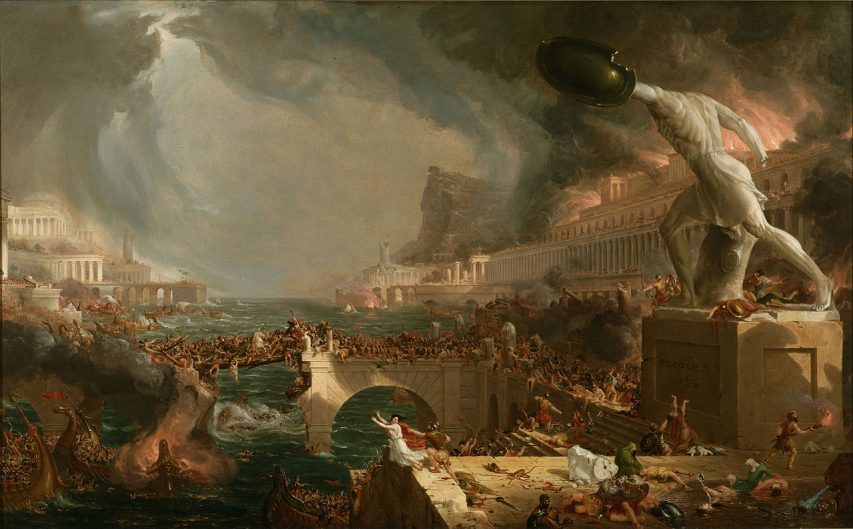In the latest Libertarian Enterprise, Sean Gabb reacts to the changes (or lack of changes) on Brexit Day:

London on the morning after Brexit Day, according to the BBC and other mainstream media.
The Course of Empire – Destruction by Thomas Cole, 1836.
From the New York Historical Society collection via Wikimedia Commons.
Yesterday evening — that is, the 31st January 2020 — at 11pm GMT, my country left the European Union. We did so after four years of heated and often hysterical argument. Nothing much seemed to have changed this morning. I went out shopping, to see the same people buying the same things at the same prices. Since we are now in a transition period, lasting till the end of this year, in which we remain within the Single Market and subject to the rules of the European Union, it would have been odd if anything visible had changed. Yet, if nothing visible had changed, one very important thing has changed.
The ruling class has suffered its first serious defeat in living memory. The coalition of politicians, bureaucrats, lawyers, educators, media people and associated business interests who draw wealth and power from an extended state was committed to European Union membership. This coalition was never uniformly committed to membership. Some elements were strongly committed, others only mildly. But all were agreed that membership was good for them, so far as it blurred the lines of accountability and gave the exercise of power a supranational appearance. This was the position before the 2016 Referendum, which was not expected to go as it did. When the result was to leave, ruling class support for membership strengthened. Long before it ended, the referendum campaign had become a vote of confidence in the ruling class. Losing this vote was a shock. The people could not be given what they had asked for. It would set a precedent. Give them that, and they would start believing they lived in a democracy where votes counted for something. If this happened, the people might be inclined to start asking for other things – all things variously unwelcome within the ruling class.
The ruling class response to losing fell under two headings. One was to deny the validity of the vote and to demand another, and to make sure that this one was rigged in favour of remaining. The other was to deliver an exit so partial that it amounted to continued membership, and that could be upgraded to full membership after a few years of propaganda. These responses eventually merged into a single project of dragging things out so long that the people would get bored and stop demanding that their voice should be heard.
These responses failed. The people had spoken, and they continued speaking — eventually giving the Conservatives their biggest majority in a generation. Because of this, our departure yesterday was more definite than had previously been imagined. Immediately after the Referendum, I think most of us would have accepted a slow disengagement — perhaps including ten or twenty years of remaining within the Single Market, though out of the customs and political union. The next three years of bad faith killed any taste for gradualism.
Emphasis added.



